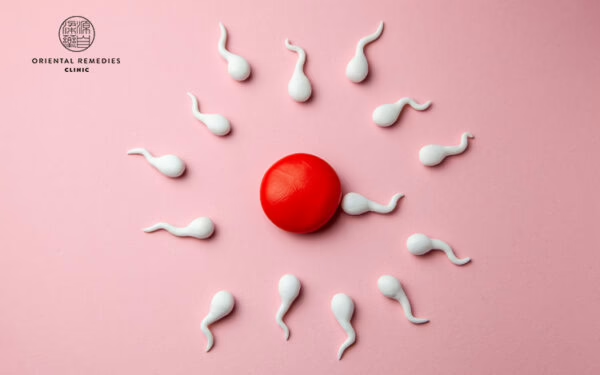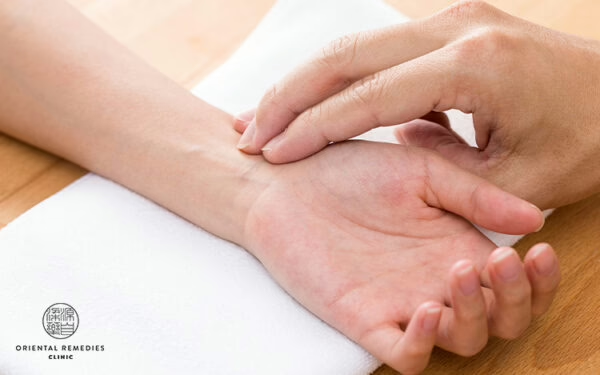5 Reasons to Try TCM for Alternative Fertility Treatments

Link copied! For many individuals and couples facing fertility issues, the desire to bring new life into the world can be emotionally and physically taxing. However, in recent years, Traditional Chinese Medicine (TCM) has emerged as an alternative or complementary approach to Western fertility treatments. TCM, rooted in ancient wisdom and holistic principles, offers a unique perspective on fertility—one that resonates with the desire for balance, harmony, and natural well-being. In this article, we will explore why an increasing number of people are turning to TCM as an infertility treatment in Singapore. Keep reading to find out more. 1. TCM Works in Tandem With Western Fertility Treatments You do not have to choose between one or the other. In fact, many couples find that combining TCM for fertility with Western treatments can enhance their chances of success. As a complementary fertility therapy, TCM can help prepare your body for procedures like IVF or IUI. Through acupuncture and herbal medications, TCM supports both the body and mind, making the process more effective and less stressful. 2. Natural Treatments for a Gentle Approach If you are concerned about the potential side effects of Western fertility treatments, TCM provides a gentler and more natural alternative. TCM practitioners at Oriental Remedies Clinic focus on restoring balance and harmony within the body through the combination of traditional and tech-enhanced therapies. This solution can be especially appealing to individuals who prefer a holistic, drug-free path to fertility. Learn more: 7 TCM Tips to Boost Fertility the Natural Way 3. Ideal for Family Planning TCM is not just for couples struggling with infertility. They are beneficial in improving your overall reproductive health and increasing your chances of conceiving when you are ready to expand your family. Beyond that, these alternative fertility treatments can help to support a smooth pregnancy and aid in faster recovery post-childbirth for women. 4. Tech-Enhanced Therapies That Support and Enhance Treatments Some TCM clinics in Singapore have embraced technological advancements to enhance their fertility treatments. At Oriental Remedies clinic, our physicians utilise tech-enhanced therapies such as Electro-Lymphatic Therapy and Cell Pro Therapy to support and improve the success rate of conceiving. When couples face multiple imbalances in the body, due to chronic stress, inflammation, and poor blood and lymphatic circulation, the combination of TCM and technology together can target these issues more efficiently, providing a holistic treatment that accelerates your fertility journey. 5. Boosts Overall Health and Well-Being TCM does not just focus on fertility; it promotes overall health and well-being. When you choose TCM as an alternate approach to fertility treatment, you are not just targeting one aspect of your health. You are nurturing your body’s balance, which can lead to better physical and emotional health. Many patients report increased energy, reduced stress, and improved mood, which can all contribute to higher chances of conceiving1. TCM: Your Natural Path to Fertility If you are exploring alternative fertility treatments in Singapore, consider the benefits of TCM. Remember, it is essential to consult with a qualified TCM practitioner known for their expertise in fertility care. They can create a personalised TCM fertility care plan that addresses your unique needs and concerns. Our physicians at Oriental Remedies Clinic are committed to supporting your fertility journey every step of the way. Get in touch with us to find out more. References: 1 Sharma, R., Biedenharn, K. R., Fedor, J. M., & Agarwal, A. (2013). Lifestyle factors and reproductive health: Taking control of your fertility. Reproductive Biology and Endocrinology: RB&E, 11, 66. https://doi.org/10.1186/1477-7827-11-66 RELATED TOPICS YOU MIGHT ALSO LIKE
4 Myths About Male Fertility & How TCM Helps

Link copied! Bringing a child into the world is a dream cherished by many couples. However, when the path to parenthood becomes challenging, it is natural to seek answers and solutions. It is a common misconception that fertility issues are solely the woman’s concern but the truth is, male fertility plays an equally crucial role. In this article, we will debunk some of the most common myths about male fertility and explore how Traditional Chinese Medicine (TCM) for fertility can be an alternative to overcoming these obstacles. Learn more: Improving Male Fertility Using Traditional Chinese Medicine (TCM) Myth 1: Only Women’s Health Matters When It Comes to Conceiving A prevalent misunderstanding is that a woman’s health predominantly influences fertility. While a woman’s well-being is undeniably essential, men should not overlook their role in this process. Factors such as smoking and excessive alcohol consumption can significantly impact the production and quality of sperm. Therefore, men also need to prioritise their health to increase the couple’s chances of conceiving. Myth 2: Age is Not a Concern When It Comes to Male Fertility While older men can still father children, sperm quality tends to decrease with age, leading to potential fertility challenges. Men of all ages should be mindful of this when planning to start a family. Myth 3: Heat Exposure Does Not Affect Fertility In Men Prolonged exposure to high temperatures has been associated with poorer male fertility. This is because sperm production and vitality depend on maintaining an optimal temperature within the scrotum, slightly lower than the body’s core temperature. When this delicate balance is disrupted due to prolonged heat exposure, it can impair sperm production in terms of both count and motility, making it more challenging for couples to conceive. Beyond external sources of heat, poorly managed metabolic conditions can also contribute to elevated body temperature, creating an unfavourable environment for sperm production. Conditions like hyperthyroidism and diabetes, for instance, can lead to increased inflammation which raises the body’s core temperature. Myth 4: Fertility Has Nothing to Do with Lifestyle Habits Contrary to the belief that lifestyle habits have little effect on fertility, our daily lives expose us to free radicals from various sources like cigarette smoke, plastics, alcohol, and electromagnetic frequencies from digital devices. Excessive free radicals can cause oxidative stress in the body, which can result in poor sperm quality. Thus, adopting a healthy lifestyle and minimising exposure to these harmful factors is crucial for improving male fertility. How TCM for Fertility Lends a Helping Hand Many couples, even those undergoing IVF/IUI, turn to TCM for fertility support. Its holistic approach to health and well-being and infertility treatments play a significant role in enhancing one’s chances of conceiving. 1. Herbal Medications Rather than merely targeting the symptoms of infertility, herbal medications aim to address the underlying causes. This can include correcting imbalances that lead to metabolic conditions, clearing inflammation from the body, alleviating deficiencies that affect sperm quality, and addressing other factors that may affect male fertility. It is essential to note that herbal medication as an infertility treatment is not a universal solution — seek guidance from a certified physician to develop a personalised treatment plan. Learn more: Top 30 Foods You Should Eat To Boost Your Fertility 2. Acupuncture Stress can lead to conditions like Liver Qi stagnation and Spleen Qi deficiency, both of which can disrupt the delicate balance required for optimal reproductive function. Acupuncture for fertility targets acupoints in men promoting Qi flow for stress relief and those linked to the Kidney and Spleen meridians to improve sperm quality. It also balances hormone levels and endocrine function, thus boosting sperm quality and viability 3. Electro-Lymphatic Therapy (ELT) ELT uses an FDA-registered device to stimulate proper flow and drainage of the lymphatic system with a gentle, non-invasive technique. By improving lymphatic flow and drainage, it helps to clear inflammation. The lymphatic system also plays a role in hormone regulation, making ELT a valuable tool for managing metabolic conditions linked to hormonal imbalances. Hence, ELT can support the management of metabolic conditions, protecting sperm quality while increasing sperm count through the improved circulation of testosterone. 4. Cell Pro Therapy Cell pro therapy helps reduce oxidative stress to protect sperm quality. The therapy introduces reducing electrons into the body, which function as an antioxidant to neutralise free radicals that cause DNA damage in sperms. It is also able to balance the autonomic nervous system and support hormone regulation, leading to a healthier reproductive system Your Journey to Fatherhood Begins Here Oriental Remedies Group offers comprehensive support for couples trying to conceive, whether through TCM fertility treatments or tech-enhanced therapies. Combining the wisdom of TCM with modern biomedical knowledge, our physicians can help couples on their fertility journey at all stages. Whether you are already undergoing IVF/IUI or have just started exploring fertility support, we can provide you with a personalised plan to increase your chances of conceiving successfully. Get in touch with us to find out more. Note: all words in Italics mentioned henceforth refer to the TCM organ system and not the anatomical organs/terms referenced in western medicine. Disclaimer: The information on this page is for information and educational purposes only. Such medical information may relate to disease, injury, drugs and other treatments, medical devices and/or health products. Medical information does not amount to advice, and if advice is needed an appropriate professional help should be sought. The disclaimer asserts that no warranties or representations are given in respect of the medical information, and that the website operator should not be held liable if a user suffers any injury or loss after relying upon the medical information. All wellness assessments and technology-enhanced therapies using wellness device(s) are intended for use only for general well-being purposes or to encourage or maintain a healthy lifestyle, and it is not intended to be used for any medical purposes (such as detection, diagnosis, monitoring, management or treatment of any medical condition or disease). Any health-related information provided by these
The Evolution of TCM: From Traditional Methods to New Tech-Enhanced Wellness Assessments & Therapies

Link copied! Traditional Chinese Medicine (TCM), a practice steeped in history, has captivated the hearts and minds of not only Eastern societies but also those in the West. Just as humans constantly evolve and progress, TCM has also undergone transformations throughout its history, continuously reinventing itself to adapt to the ever-changing needs of humanity. While the traditional elements and time-tested methods of TCM have remained steadfast, a new wave of exploration has also unfolded. More physicians and researchers are now delving into the possibilities of intertwining ancient wisdom with technology. The result is a fusion of the old and the new, where tech-enhanced assessments and therapies have revolutionised TCM clinics in Singapore and worldwide, offering patients bespoke treatments tailored to their individual needs. Discover the evolution of TCM, from its ancient origins to remarkable advancements that have reshaped the landscape of holistic wellness in this article — keep reading to find out more. Part 2 – Everything You Need to Know About TCM 2.1 Introduction to TCM and Its History TCM traces its origins back to the shamanistic era of the Shang dynasty, flourishing between 1766 and 1122 BC. It was during this time that the foundations of TCM began to take shape, with healers and practitioners delving into the mysteries of the human body and its connection to the natural world. Over the following centuries, TCM underwent a gradual evolution, incorporating new discoveries, refining its theories, and expanding its repertoire of therapies. As its effectiveness became increasingly evident, TCM garnered widespread recognition as a holistic and natural medical therapy within China. Its reputation then extended far beyond its borders as years went by, captivating the curiosity and interest of countries around the globe. In the present day, TCM continues to thrive, often complementing Western medicine to provide all-rounded care to patients. One example of this integration is the use of Chinese herbs prescribed by TCM physicians as post-surgical supplements to expedite recovery and support the body’s healing. This harmonious collaboration between TCM and Western medicine emphasises the recognition of the unique strengths that each system brings to the table. However, it is important to note that TCM diverges from Western medicine in fundamental ways. While Western medicine primarily focuses on treating specific symptoms and diseases, TCM takes a holistic approach to health and wellness. At the core of TCM philosophy is the belief that our well-being is intricately connected to the balance of Qi, the vital life force that flows through our bodies. TCM physicians strive to understand and harmonise the intricate interplay between the physical, mental, emotional, and spiritual aspects of our being. Central to TCM’s approach is the restoration of balance between Yin and Yang, the opposing yet complementary forces that underpin all aspects of existence. Imbalances or disruptions in this delicate combination are believed to impede the flow of Qi, resulting in illnesses and ailments. TCM therapies such as acupuncture, herbal remedies, and dietary adjustments are designed to rectify these imbalances, thereby promoting the body’s innate capacity for self-healing. As we delve deeper into the realm of TCM, we will also explore its perspective on illnesses and ailments. 2.2 TCM’s Perspective on Illnesses and Ailments TCM offers a unique perspective on illnesses and ailments, rooted in the belief that maintaining the delicate balance between Yin and Yang is crucial for optimal health. To restore balance, TCM focuses on achieving equilibrium between the internal organs and the external elements: earth, fire, water, wood, and metal. Each element corresponds to specific organs and bodily functions, and an imbalance in any of these elements can have a profound impact on overall health. TCM therapies aim to identify and address these imbalances by removing obstructions and promoting the flow of Qi, allowing the body’s natural healing mechanisms to take effect. But what truly sets TCM apart is its preventive approach to healthcare — rather than solely treating existing illnesses, TCM highlights the importance of maintaining wellness and preventing diseases from taking root. Through therapies like acupuncture, moxibustion, and lifestyle modifications, TCM seeks to enhance the body’s resilience and bolster its natural defences. This proactive approach to health empowers individuals to take charge of their well-being and cultivate a state of balance that supports long-term vitality. While TCM does not replace conventional or allopathic treatment, particularly for serious conditions, it is effective when used in conjunction with Western medicine, forming an integrative approach that can enhance the overall treatment plan. Collaboration between healthcare professionals from both disciplines allows patients to receive comprehensive care that combines the strengths of two systems, potentially leading to improved outcomes and a higher quality of life. It is also important to exercise caution and communication when integrating TCM with Western medicine. Some TCM herbal medicines may interact with or have toxic effects when combined with certain Western medications. It is, therefore, vital to inform both your Western medicine doctor and TCM physician about all the treatments and remedies you are using. This ensures that potential interactions and contraindications are identified, and appropriate adjustments can be made to your treatment plan, prioritising your safety and well-being. With a deeper understanding of TCM, continue reading to gain insight into the potential of TCM to restore balance, prevent ailments, and contribute to overall well-being. 2.3 Traditional TCM Treatments and Their Benefits TCM encompasses a diverse range of therapies, each offering unique benefits and contributing to the restoration of balance. Acupuncture One of the most well-known and widely practised TCM treatments, acupuncture involves inserting thin needles into acupoints on the body to stimulate the flow of Qi and restore balance. This therapy has been used for centuries to address a wide range of diseases and problems, including chronic and acute pain, digestive disorders, respiratory conditions, stress-related ailments, and even infertility. Acupuncture is known for its ability to alleviate pain, promote relaxation, and enhance overall well-being. Learn more: 6 Common Myths About Acupuncture Debunked Cupping Cupping involves placing heated glass cups on the skin to create a suction effect. This
Supporting Women’s Health With TCM

Link copied! As women, we navigate a unique journey of physical and emotional changes throughout our lives. From the delicate dance of hormones during our menstrual cycle to the transformative stages of pregnancy and menopause, our bodies deserve special care and attention. Traditional Chinese Medicine (TCM) offers a holistic approach to health and wellness, focusing on restoring balance and harmony within the body. For women in Singapore seeking natural remedies for various health issues, TCM provides a time-tested solution. In this article, we will explore how TCM supports women’s health throughout different life cycles, from menstruation to menopause. Keep reading to find out more. Women’s life cycles 1. Menstrual cycle The menstrual cycle can bring various challenges, including the late onset of first menses, irregular periods, menstrual cramps, and ovulation bleeding. TCM offers effective solutions by regulating the menstrual cycle, reducing pain, and alleviating discomfort. Through herbal remedies, acupuncture, and dietary adjustments, TCM helps restore harmony to the body, promoting a healthier and more regular menstrual cycle. 2. Pre-pregnancy, pregnancy and post-pregnancy Preparing the body for pregnancy is crucial for both men and women. TCM for fertility plays a vital role in this stage, assisting couples in their journey towards conception. By addressing hormonal imbalances and optimising reproductive health, TCM enhances the chances of successful conception. TCM can help couples trying to conceive naturally and those undergoing assisted reproductive technology treatments like IVF. Acupuncture is often used to promote ovulation in preparation for egg retrieval procedures and is used to enhance the success of implantation after embryo transfers. During pregnancy, TCM can also help alleviate early symptoms of miscarriage, lower back pain, and general discomfort. Post-pregnancy, TCM provides support with practices like confinement rituals, lactation support, and treatments such as acupuncture to strengthen the body’s recovery and alleviate discomfort from conditions like mum’s wrist or backache that arise from caring for their newborns. 3. Menopause As women enter menopause, they experience a range of symptoms such as irregular periods, heavy flow, disrupted cycles, hot flashes, and night sweats. TCM offers effective relief by balancing hormones and improving overall well-being. Herbal remedies, acupuncture, and lifestyle adjustments tailored to each individual can help manage these symptoms, allowing women to embrace this transformative stage with greater ease and comfort. Common health conditions that affect women From menstrual cramps and irregular periods to post-menopausal syndrome and infertility, women often face a range of health concerns. While Western medicine provides valuable diagnostic tools and treatments, TCM for women’s health offers a complementary and holistic approach to address these conditions. 1. Menstrual cramps and irregular periods Menstrual cramps and irregular periods are common complaints among women and TCM recognises that these issues may be manifestations of imbalances within the body. By considering the body as an interconnected system, TCM aims to restore harmony and regulate the menstrual cycle. Learn more: Physician’s Guide To Manage And Relieve PMS 2. Post-menopausal syndrome As women transit into menopause, they may experience a range of symptoms collectively known as post-menopausal syndrome. TCM for menopause approaches post-menopausal syndrome by seeking to balance the body’s Yin and Yang energies. 3. Infertility Infertility is a deeply personal and emotionally challenging issue that many women face. Western medicine often diagnoses infertility as a result of hormonal imbalances, polycystic ovary syndrome (PCOS), endometriosis, uterine fibroids, or ovarian cysts. Whereas TCM for fertility offers a comprehensive and individualised approach to address the underlying causes by focusing on optimising the body’s overall health, balancing hormones, improving circulation, and supporting reproductive organs. Learn more about TCM for fertility:Improve your IVF Success Rate With AcupunctureWhat is Cold Womb Syndrome – are you suffering from it? 4. Vaginal infections or irritation Vaginal infections or irritations, such as yeast infections or bacterial vaginosis, can cause discomfort and disrupt a woman’s daily life. While it is recommended to seek the advice of a Western doctor for prompt relief, TCM can play a supportive role in preventing recurrence and maintaining vaginal health in the long run. TCM treatments often help strengthen the body’s immune system and balance its natural flora. 5. Urinary tract infections (UTI) UTIs are a common issue among women, causing pain and discomfort. It is advisable to consult a Western doctor for prompt diagnosis and treatment, as UTIs can progress quickly. However, TCM can be used in conjunction with Western medicine to support the body’s healing process and prevent recurrent infections. TCM for women’s health focuses on strengthening the body’s immune system, promoting urinary tract health and restoring balance within the body. How TCM and tech-enhanced therapies work hand in hand TCM has long been revered for its holistic approach to well-being, and now, advancements in technology enhance its effectiveness in addressing various women’s health issues. Learn more: A TCM Experience Like No Other: 6 Tech-Enhanced Assessments & Therapies 1. Menstrual-related issues Herbal medications tailored to individual needs can be formulated to correct imbalances, primarily focusing on regulating the Liver and Kidney functions while invigorating the Blood and Qi. Acupuncture promotes the flow of Qi and strengthens vital organs involved in the menstrual cycle. For conditions related to coldness or Blood stagnation such as Cold Womb Syndrome, therapies like moxibustion and tech-enhanced therapies like Far-Infrared (FIR) Therapy can be employed. Moxibustion uses heat from burning mugwort to warm specific acupuncture points, while FIR therapy utilises gentle heat to penetrate deep into tissues, improving blood circulation and alleviating menstrual discomfort. Electro-Lymphatic Therapy (ELT) is another tech-enhanced approach that can benefit women with inflammatory conditions like endometriosis, PCOS, uterine fibroids, or cysts. ELT improves lymphatic circulation and drainage, reducing inflammation, and enhancing blood circulation, leading to better menstrual flow and overall well-being. 2. Pregnancy-related issues Herbal medications can be tailored to recondition the body’s imbalances, strengthen the Kidney and womb, and improve blood circulation to support uterine lining growth for successful implantation. Specific herbs may also be prescribed to prevent miscarriage, while confinement herbs aid in postpartum recovery by strengthening the body and replenishing blood loss. Acupuncture can support assisted reproductive
7 TCM Tips to Boost Fertility the Natural Way

Oriental Remedies Clinic Are you struggling to conceive and considering fertility treatment but hoping to find a more natural and holistic solution? Consider Traditional Chinese Medicine (TCM). Having been used for centuries to improve reproductive health and boost fertility, TCM is a safe complement to many conventional infertility treatments in Singapore. Through techniques such as acupuncture, herbal remedies and dietary changes, TCM for fertility can help regulate your menstrual cycle, improve sperm count and quality, and create a nurturing environment for conception. Keep reading for tips to boost fertilty the natural way, according to RCM. 1. Keep your lower abdomen warm (for women) TCM physicians believe that keeping the lower abdomen warm can help ensure good blood circulation to the womb, creating an ideal environment for implantation. It also prevents coldness from entering the body which helps regulate the menstrual cycle and alleviate cramps. Prioritise cosy, warm clothing over tight-fitting and short outfits to avoid cold womb syndrome. 2. Enhance your IVF and IUI success with TCM for fertility There is no harm in getting a fresh perspective from another practitioner – in fact, TCM for fertility can work in tandem with Western treatments like IVF and IUI to increase success rates. With its focus on restoring balance and harmony within the body, TCM can help improve blood flow to the reproductive organs, regulate hormonal imbalances and reduce stress and anxiety – factors that can contribute to infertility. 3. Try herbal medications TCM also uses herbs to support the reproductive health of both partners to increase the chances of conception. From Dang Gui to Bai Shao, there are numerous herbs that can help regulate menstrual cycles to improve follicle development and ovulation. Furthermore, herbal tonics keep the body warm and nourish it with Qi, creating an optimal environment for implantation and pregnancy. When it comes to addressing fertility issues in men, Chinese herbs can be a powerful tool too – wolfberries and Chinese dodder seed are often used to support the Kidney and Liver, while Codonopsis root and Astragalus are utilised to target the Spleen and Lung Qi. These help to improve sperm quality and quantity. 4. Consider acupuncture Acupuncture for fertility offers both men and women a multitude of benefits. When specific acupoints are stimulated, blood flow and hormone levels in women get regulated, improving ovulation and improving the chances of conceiving. Acupuncture can also be a valuable tool for women struggling with conditions like endometriosis or polycystic ovary syndrome, which can affect ovulation and embryo implantation, hence reducing the chances of conceiving. Stress is also a major factor that can negatively impact male fertility, and acupuncture can help address that too. By reducing mental stress and releasing tension and anxiety, acupuncture relieves Liver Qi stagnation, Spleen and Kidney Qi deficiency to promote a healthier environment for sperm production and support the overall reproductive health of men. 5. Load up on fertility-boosting food – especially rice When it comes to TCM for fertility, physicians tend to emphasise the importance of diet and nutrition as the food you consume is seen as a powerful tool for promoting balance and harmony within the body, which is essential for optimal reproductive health. By nourishing your body with the right food, you can help support your body’s natural processes and improve your chances of conception. A diet rich in unsaturated fats, whole grains, vegetables and fish that have been linked to improved fertility in both men and women is recommended. A special tip from our physicians is to incorporate rice in your meals – even for ladies who are on a diet but planning to conceive. TCM views grains as a good source of nourishment for the Spleen which is necessary for the production of sufficient Qi & Blood to support the proper functioning of the body’s organs, including your reproductive organs. If you are underweight or malnourished, your chances of conceiving can be impacted. Our TCM physicians recommend adding at least a small portion of rice to your diet for your fertility. Learn more: Top 30 Foods You Should Eat To Boost Your Fertility 6. Manage stress levels In TCM, stress is seen as a major contributor to a variety of fertility issues, including irregular menstrual cycles, poor egg quality and low sperm count. This is because stress can lead to imbalances in the body’s Qi, which is the vital life force that flows through all living things. When Qi is flowing smoothly, the body is able to function optimally and maintain balance. But when Qi becomes stagnant or blocked due to stress, it can create a range of health problems including fertility issues. Incorporate stress-reducing practices like meditation, acupuncture for fertility or stretching exercises such as yoga or pilates into your routine to encourage a good flow of Qi and increase the chances of conceiving. 7. Cut down on smoking and drinking The Kidneys and Liver are considered key organs for reproduction according to TCM and smoking and drinking can compromise their functions, making it more difficult to conceive. Smoking is particularly harmful, as it can lead to a decrease in both sperm count and motility, as well as affect the quality of eggs. Similarly, excessive alcohol consumption can disrupt the balance of hormones and negatively impact ovulation in women. Focus on adopting healthy habits instead, like regular exercise and a balanced diet, to enhance overall health for conception. Let TCM support you through your fertility journey It is natural to feel overwhelmed and unsure about what to do next if you are struggling with infertility, but do not give up hope just yet. TCM could be the missing piece to the puzzle – from acupuncture for fertility to herbal medications, TCM can improve your chances of conception while also addressing any underlying imbalances that may be affecting your reproductive health. Whether you are just starting out on your fertility journey or you have been trying for a while, let our team here at Oriental Remedies Group be your partner in